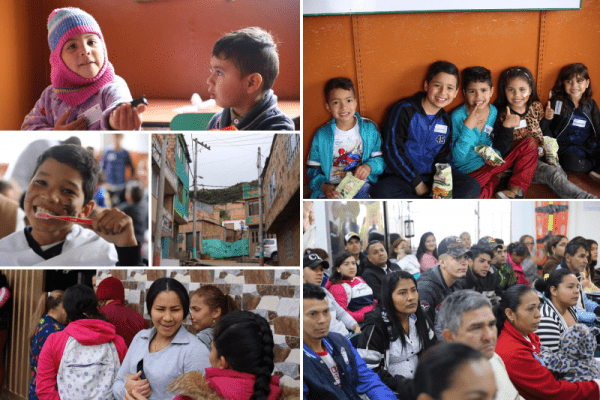We had our third activity last Saturday. Now, the project has served 250+ people, including children and mothers from Venezuela who have arrived in Colombia. By getting extra funding from different partners (school supplies from BBVA, food from RAMO and ROA, volunteer work from FRATERNIDADE, free locations from the Office of the Mayor of Bogotá and from different churches and communitarian organizations around Bogotá, and free administration and intellectual services from BETHANY, our main partner) the project has got to more people than we ever thought possible, and we have spent less than 60% of the total funds. Now, I am trying to extend the project for the future, providing more Venezuelan migrants with the booklet we’ve prepared, or by creating either a semi-permanent leisure space for newly arrived migrant children in Bogotá’s bus terminal, a food bank for migrants in one of the poorest neighborhoods we’ve been working on, or some extra sessions for different groups of migrants (if you have suggestions about this please write to me at andrescaro@uchicago.edu ASAP!).
During the second activity we encountered the terrible phenomenon of xenophobia in Susa, a town close to Bogotá. The migrants that were present in the session are scared from the municipal officers and even fear violence. However, they are mostly hopeful about the prospect of normalizing their migration status in Colombia. Thus, the subject of our second workshop was based on avoiding violence and xenophobia by empowering the Venezuelan migrants with knowledge of their fundamental rights, and by offering means of self and institutional protection against different threats.
When we got to Usme, one of the poorest, more violent, and more diverse localities of Bogotá, we were expecting to find the same situation. However, Bogotá has proved to be more hospitable than some other towns in Colombia –of course, it is a richer city, with more services and resources to share. A couple of communitarian leaders offered their large home for our daily program. There, I had the chance to personally interview two migrants who told me about their experiences. I want to briefly tell you about them because their stories show the courage and dignity of the Venezuelan migrants in Colombia.
First, I met a gentleman from Valencia, Venezuela. His wife is Colombo-Venezuelan (a destiny shared by thousands of inhabitants of the border towns of both countries) and thus his family prospects of getting normal social services in Colombia are better than the chances of almost every other migrant. He left Venezuela six months ago. There, he used to work in a factory. One day, the guards of the factory didn’t allow any worker to get inside to work. They told them that the owners had left to Spain. When he arrived to Colombia with his two children, he met his wife, who was living in Usme. Although the kids have been attending public school, their father’s prospects are far from encouraging. He has tried to get a regular job in construction, but he only has had the chance to work as a journeyman in different, underpaid tasks in the neighborhood. The family is currently living in a house they share with other migrants from Venezuela. There, they have rented a room in which all four live. In total, there are 21 persons living in their house.
Then I met a lady from the coastal part of Venezuela, who arrived one year ago with her three children, leaving behind a fourth one with her parents. She decided to leave Venezuela because even while having a job, food scarcity forced her family to eat just arepas and a little bit of rice every day. The kids were usually telling her how hungry they were until one day she decided to leave to Colombia without any papers. In Colombia, where she came with almost no money (she had to make a deal with the bus ticket vendor in order to get the three kids in the bus to Colombia with her), she encountered her partner, who has been working in the rusa, as they call construction works here in Bogotá. She hasn’t found a job and she is clearly depressed, wishing to go back to Venezuela as soon as the socioeconomic situation gets better there. She told me that what saves her every day is the sight of her kids, wearing their uniform to attend the public school in Bogotá. There are days in which she doesn’t leave her room (her family also lives in a single room) and she just stays there. The kids, as most children in Bogotá’s public-school system, get breakfast, snacks, and lunch in the school, and so they are getting to eat good proteins and calories (something that did not happened in Venezuela). However, in their house they can only afford to buy pasta, rice, or some grains like beans or lentils. Some nights, the lady I talked to told me, she sleeps without having eaten dinner in a mattress on the floor.
I didn’t want to decorate or modify the stories because it seems to me that they offer a glimpse of the lives of the people that the project is trying to positively affect. The magnitude of the problem (more than one million and a half Facebook accounts that were created in Venezuela have been accessed from Colombia for the first time in the last two years) is yet to be discovered by the public institutions of Colombia and by Colombians themselves. The project seeks to give insights and ideas to a relatively small number of migrants and is just one of many first steps that have to be taken in order to guarantee the wellbeing and dignity of persons that are facing similar conditions to the ones described above.
